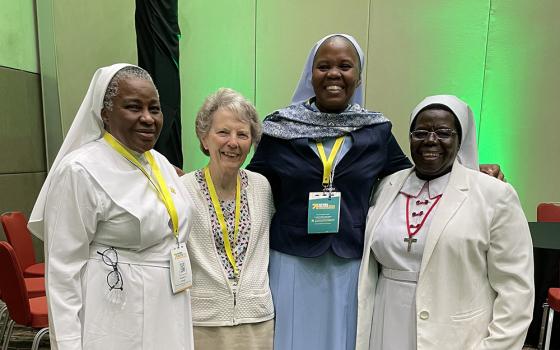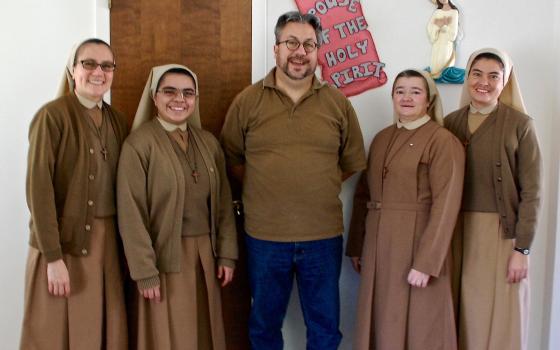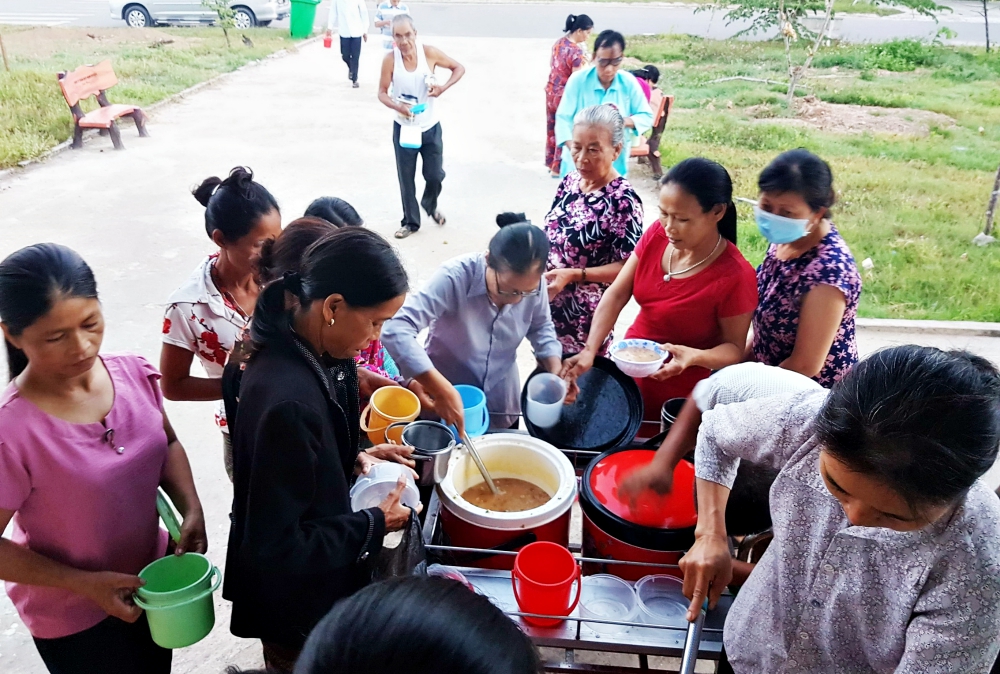
Lovers of the Holy Cross of Hue Sr. Anna Nguyen Thi Hien, center, serves chao to patients' relatives in the hospital yard of Quang Tri General Hospital. (Joachim Pham)
Nguyen Manh Toan, who looks tired and thin, is already in the hospital yard at 5 a.m., holding two plastic boxes and waiting for the nuns to give him breakfast.
Toan, a former soldier, smiles at the sisters who offer him chao, a traditional breakfast dish of rice cooked with beef, pig bones and vegetables.
"I am very happy to receive chao for my wife and me from the nuns. Without their food, we have to spend 40,000 dong [$1.72] buying food for our breakfast each day," he said while carrying the food to his wife, who undergoes medical treatment for duodenum tumors at Quang Tri General Hospital in Dong Ha City, northern central Vietnam.
The 74-year-old farmer from Quang Tri Province said that on days the nuns do not serve breakfast, he walks one hour to restaurants outside the hospital to buy food at the right price for his wife.
"I only drink tea for breakfast to save money," he said, adding that many other people with relatives in the hospital also starve themselves like him.
Toan said his wife had been hospitalized for weeks, waiting for an operation to remove the tumors that costs an estimated 22 million dong. He used the money he earned from selling his crops to cover her treatment.
Sr. Anna Nguyen Thi Hien of the Lovers of the Holy Cross of Hue said the nuns serve free breakfast to 150 patients and their relatives, including Toan, on Tuesdays, Wednesdays and Thursdays at Quang Tri General Hospital.
Hien, head of the Dong Ha convent, said she and two other sisters get out of bed at 3:30 a.m. to prepare and carry chao from their convent to the hospital.
She said the nuns started to provide "chao of love" in 2005, after they visited patients at the hospital and found the relatives looking half-starved, thin and tired because they did not have breakfast. Some used cold rice and cooked chao for their breakfast, eating it with only salt.
Advertisement
Many Van Kieu ethnic people must walk 30 kilometers from their homes to the hospital, and some of them arrive faint from hunger on the road.
"The motherhouse offers us rice and money to buy beef, pig bones and beans to cook chao," Hien said. "We serve good food for people's health, not for profit."
At first, they provided breakfast for 50 people per day.
Hien, 62, said the ministry serves as a bridge between the nuns and patients.
"Relatives take us to visit patients, and we have chances to listen to their worries and feelings," she said. "Some men sold all of their property to pay for their wives' medical treatment and asked us to raise their children after their death." Many couples have four or five children.
"Some people asked us to read Bible passages to them while others asked for blankets and mosquito nets," she said. "Many appreciate our services and want to embrace Catholicism. We introduce them to priests." Thanks to the sisters' work, hundreds of ethnic people have converted to Catholicism since 2005, she said.
"We treat them like our families, comfort, sympathize with them, and ask benefactors to pay their medical and travel costs," Hien said.
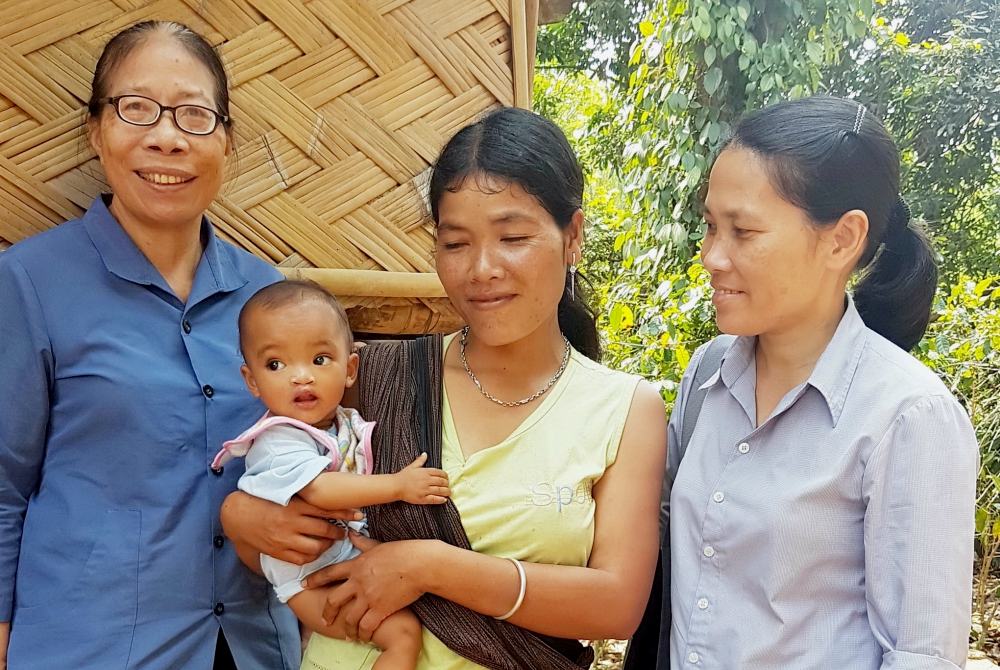
Lovers of the Holy Cross of Hue Sr. Anna Nguyen Thi Hien, left, and another sister visit a Van Kieu ethnic woman, center, and her child in Cam Lo District of Quang Tri Province. (Joachim Pham)
Hospital officials are interested in the nuns' service and allow them to supply food at a corner of the hospital yard. The communist government bans Catholic organizations from running hospitals and schools.
"They no longer suspected us of evangelizing in the hospital," Hien said. "As Catholic nuns, we serve all people regardless of their backgrounds in humility and with respect. We see the image of crucified Jesus in them."
She said the sisters plan to seek financial support from benefactors and so they can offer free "lunches of love" to hospital patients and their relatives in the future.
"Our food ministry aims to bring good health to patients and their relatives and sharing Jesus' love to all people, especially poor patients," she said.
Breakfast, lunch from St. Paul de Chartres sisters
St. Paul de Chartres sisters offer free breakfast and lunch to more than 100 patients, including people with HIV/AIDS, each day at the public Hue Central Hospital in the neighboring province of Thua Thien Hue.
They also serve delicious food to patients' relatives so they can stay healthy and care for the patients.
Le Ngoc Quoc, who is undergoing medical treatment for lung tumors at the hospital, said he has been living on free food from the nuns since he was hospitalized in mid-April.
Quoc, 73, said he is from Quang Binh Province, and his wife could not afford to care for him.
"The nuns regularly visit me and encourage me to receive their food. I am very grateful to them," the former fisherman said.
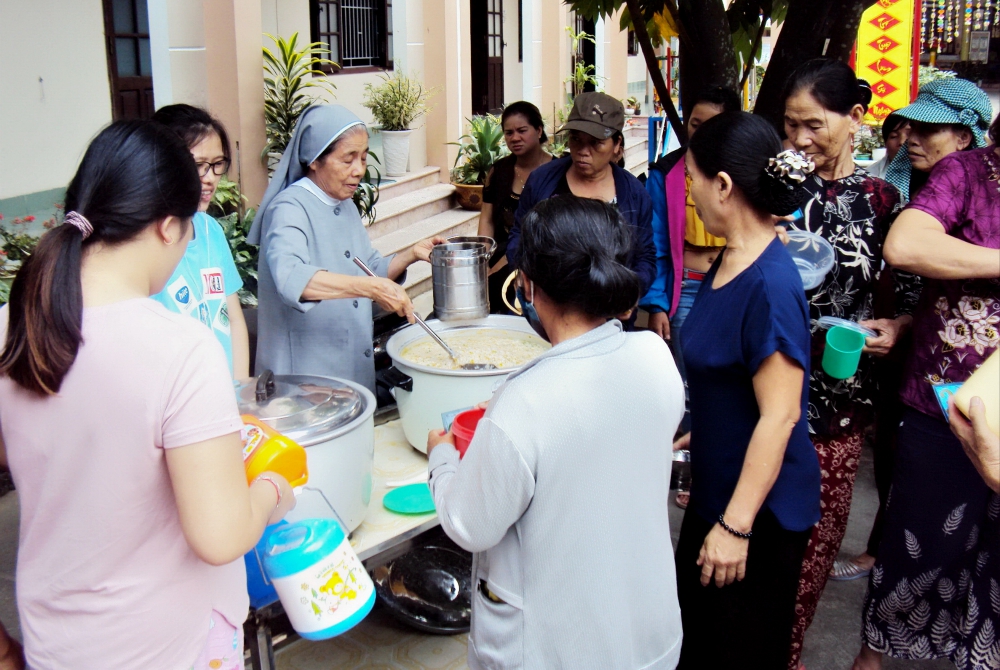
St. Paul de Chartres Sr. Josephine Huynh Thi Ly offers food to hospital patients at her convent in Hue City. (Joachim Pham)
Sr. Josephine Huynh Thi Ly, 77, said their ministry also helps care for patients' souls and establishes friendships between the nuns and health care providers and patients.
"We have good relationships with doctors and ask them to treat certain patients in need. They trust us and create conditions for us to do pastoral care for patients," she said.
Clergy and religious are publicly banned from doing pastoral care at public hospitals. But at patients' request, the nuns quietly baptize dying patients, give Communion to Catholics, and invite priests to hear patients' confessions and administer the sacrament of the anointing of the sick.
The sister, who initiated the food project in 2005, said the nuns raise pigs to make money for the ministry. Local benefactors and their relatives also donate to their work.
The nuns also give clothes, blankets, milk, sugar, money and even coffins to patients who cannot afford them.
"Our ministry provides a vital link between poor people and others," Ly said. "We try to develop such close crucial links so that we can relieve poor people of suffering and build a world with love, fraternity and charity."
[Joachim Pham is a correspondent for Global Sisters Report based in Vietnam.]



